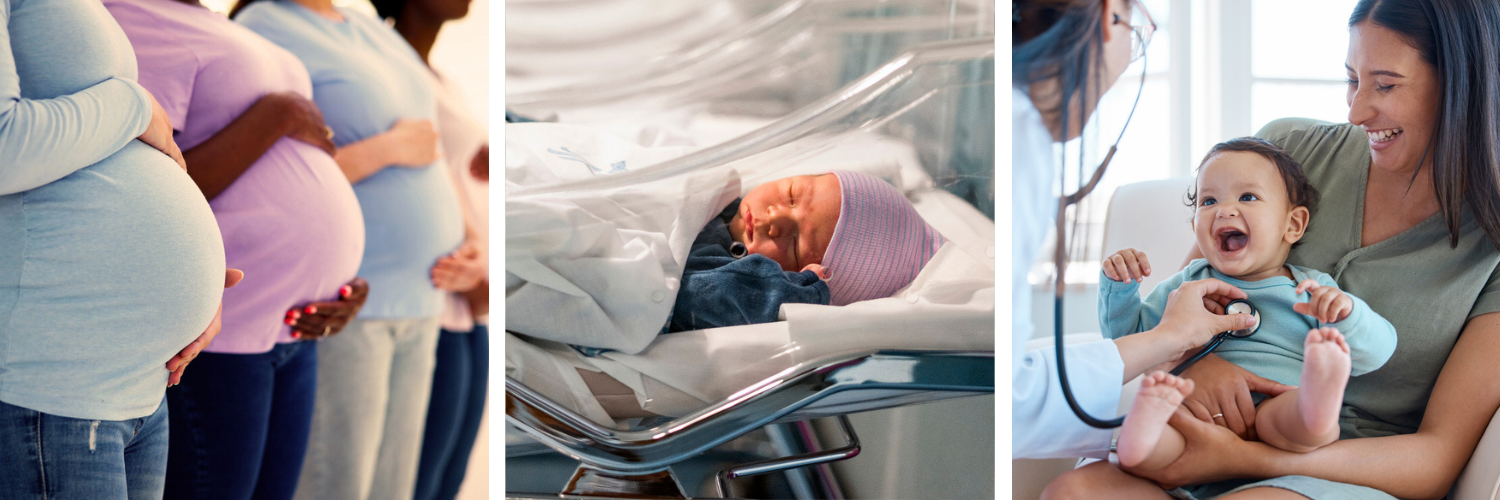Plans of Safe Care

About Plans of Safe Care
Most new parents leave the hospital and enter the sometimes-scary world of being responsible for the safety and well-being of an infant. For parents who struggle with substance use, addiction and its underlying stressors can make an already challenging time more difficult. A Plan of Safe Care is a family-centered plan designed to promote the safety and well-being of birthing parents and their infants with prenatal substance exposure.
Federal legislation requires that a Plan of Safe Care be developed for all infants exposed prenatally to substances and their birth parents/caregivers following their release from a healthcare provider. Not all families who have experienced prenatal substance use need a referral to child welfare, but it is important that they have the support necessary to mitigate risks as they bring their baby home and keep their family together and thriving.
- How Plans of Safe Care work
Developing a Plan of Safe Care is a collaborative process to create a written or electronic plan for meeting the health, safety, and well-being of an infant with prenatal substance exposure, following their release from the care of a healthcare provider. A Plan of Safe Care must also address the health, support, and substance use treatment needs of the family or caregiver(s). If possible, a Plan of Safe Care can be established during pregnancy, prior to child welfare involvement. Plans of Safe Care include referrals and follow-up care for the following elements:
- Infant’s health and well-being (i.e. high-risk follow-up care, with referral to specialty care; developmental screening and early intervention services; early care and education programs)
- Physical health of impacted caregiver and family (i.e. postpartum care, support with breastfeeding, medication and pain management)
- Behavioral health of impacted caregiver and family (i.e. substance use treatment and recovery supports; treatment for partner/other family members)
- Parenting/family support (i.e. parent education and support groups; public health nurse or home visiting programs; housing, employment support, child care and transportation)
- Why Plans of Safe Care are important
Plans of Safe Care have been recognized by Colorado policy leaders, health care providers, community members, and families as an important means to coordinate care across systems and improve health for families affected by prenatal substance use. Plans of Safe Care can strengthen protective factors, promote healthy development, and prevent child welfare involvement or out-of-home placement through connections to parenting education, safety guidance, early intervention, and wraparound resources and substance use treatment services.
Purpose of a Plan of Safe Care
Plans of Safe Care support families impacted by perinatal substance use or substance use disorders by:
- Ensuring the parent(s) and infant remain safe and healthy
- Working with the family to meet identified health and substance use treatment needs
- Connecting the family to resources in the community
- Improving care coordination across systems
Notification of exposure
Through a phased approach, the Colorado Department of Human Services (CDHS) is implementing updated policy and processes for the notification of infants exposed prenatally to substances.
Healthcare providers may now notify the State when they are involved in the delivery or care of infants affected by prenatal substance exposure, withdrawal symptoms or a fetal alcohol spectrum disorder. This notification does not include any personal information about the infant or family. The data collected is grouped together and used only to help meet federal reporting requirements, better understand how common prenatal substance exposure is in Colorado and how state policies, like Plans of Safe Care, are working to support families.
CDHS is collaborating with Colorado Hospital Substance Exposed Newborns Collaborative (CHoSEN), The Kempe Center, Colorado Evaluation and Action Lab, and Illuminate Colorado to support a phased implementation of the notification portal among Colorado hospitals. If you are interested in learning more about this phased implementation please contact Shannon Bryan at shannon.bryan@state.co.us.
- Federal requirements for notification
In 2016, the federal Comprehensive Addiction and Recovery Act (CARA) changed state responsibilities for infants exposed prenatally to substances (IEPS). As a result, the Colorado Department of Human Services (CDHS) must submit data to the U.S. Department of Health and Human Services regarding the frequency of infants being born affected by substance abuse or withdrawal symptoms resulting from prenatal drug exposure or fetal alcohol spectrum disorder. Additionally, CDHS must ensure there are policies and procedures in place to address the needs of infants born with and identified as being affected by prenatal substance exposure, including a process for health care providers involved in the delivery or care of such infants to notify the child protective services system of the occurrence of all such infants (42 U.S.C. §§ 5106(b)(2)(B)(ii)).
While notification of all infants exposed prenatally to substances is now necessary, not all of these families require referral to child welfare for concerns of abuse or neglect (CRS 19-1-103(1)(a)(IV)). For example, a pregnant person taking medications as prescribed by healthcare providers (such as methadone, benzodiazepines, or opioids for pain management) may result in an infant experiencing withdrawal and a positive toxicology screening. This would require a notification by a health care provider; however, if the family is safe and stable, a report to child welfare for concerns of abuse or neglect may not be necessary.
Policy and implementation
For questions about Plans of Safe Care policy and state implementation, email Shannon Bryan at shannon.bryan@state.co.us.
IEPS Notification form
For questions specific to the Infants Prenatally Exposed to Substances (IEPS) Notification form, email cdhs_IEPS@state.co.us.
Training and assistance
Birthing hospitals and patient care teams can request Plan of Safe Care training and/or technical assistance by completing this short survey.